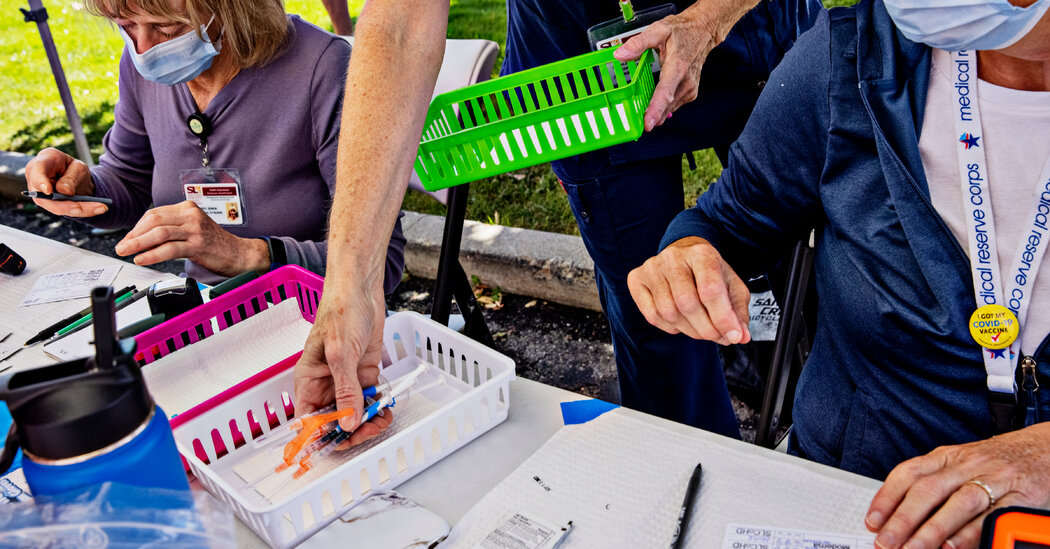Fears that Pfizer-BioNTech’s Covid booster shots could increase stroke risk in people 65 and older have not been confirmed by an intensive scientific study, federal officials said Friday.
“It is very unlikely” that the risk is real, the officials said. They urged Americans 6 months and older to continue getting booster shots. Federal officials decided to publicize the concerns and the results of their investigation, despite fears the revelation could fuel anti-vaccine sentiment.
“We believe it is important to share this information with the public,” said a joint statement from the Centers for Disease Control and Prevention and the Food and Drug Administration.
Officials declined requests to discuss details of their investigation.
The bivalent vaccine is designed to thwart the original version of the coronavirus, as well as versions of the Omicron variant that circulated in the United States over the summer. The bivalent vaccines made by Pfizer-BioNTech and Moderna are the only boosters now available in the United States, and scientists are engaged in a heated debate over their usefulness compared to the original vaccines.
It’s unclear whether the new reassurance will prompt Americans to get a bivalent shot if they haven’t already. Only 39 percent of adults age 65 and older, and only 16 percent of those age 5 and older, have received a bivalent booster shot to date.
More about the coronavirus pandemic
Concerns about a possible link to ischemic strokes – which can interrupt blood flow to the brain – first surfaced late last year. Data from the Vaccine Safety Datalink, a federal safety monitoring system, hinted that Americans age 65 and older may be at increased risk of ischemic stroke in the 21 days after receiving a Pfizer-BioNTech bivalent injection.
That signal was specific to the Pfizer-BioNTech bivalent vaccine. No similar concerns were associated with the original Covid vaccines or with Moderna’s bivalent boosters.
The data prompted federal officials to search other vaccine safety databases, as well as observations from the United States and other countries. The researchers did not find evidence of an increased risk of stroke in any of these sources, federal officials said in their statement.
Federal officials plan to discuss the findings Jan. 26 at a meeting of FDA scientific advisers on future Covid vaccines.
The Vaccine Safety Datalink is a real-time surveillance system, a collaboration between the CDC and integrated healthcare organizations and networks in the United States. The system uses electronic health data from about a dozen locations around the country to monitor vaccine safety.
Of the approximately 550,000 people age 65 and older who received the Pfizer-BioNTech bivalent booster, 130 had ischemic strokes in the 21 days after receiving the injection, raising fears that the two events were linked. But analysis of the data using a different method revealed no increased risk of ischemic stroke.
Another database, the Vaccine Adverse Event Reporting System, maintained by the CDC and FDA, also picked up no signal for ischemic strokes. Neither a major study of the bivalent vaccines, based on data from the Centers for Medicare and Medicaid Services, a preliminary study using the Veterans Affairs database, nor the Pfizer-BioNTech global safety database.
Other countries have not observed an increased risk of ischemic stroke with the bivalent vaccines, the agencies said. About 795,000 strokes are reported each year in the United States, and about 87 percent of those are ischemic strokes, according to the CDC
“There is no evidence to conclude that ischemic stroke is associated with the use of the companies’ Covid-19 vaccines,” Pfizer and BioNTech said in a statement. More than 30 million doses of the companies’ bivalent vaccine have been administered in the United States to date, according to a Pfizer spokesperson.
“Compared to published ischemic stroke incidence rates in this older population, the companies have observed a lower number of reported ischemic strokes to date” following the bivalent injection, the companies said.

